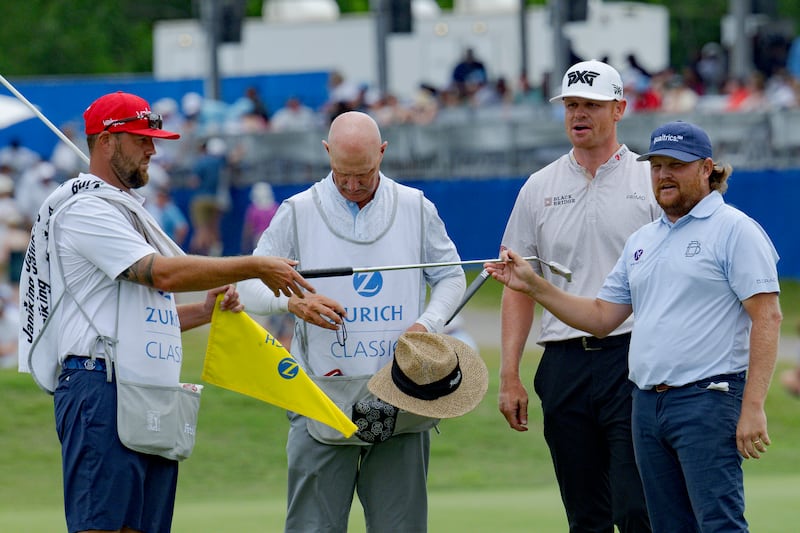
Zac Blair: The journey of resilience in the world of golf

In the world of professional golf, where every stroke can define a season, Zac Blair has become something of a legend for his unique achievement — finishing 126th in the FedEx Cup standings not once, but twice.
That is so unique. It’s one swing.
Blair said the difference between finishing 126th and finishing 125th with guaranteed status is one shot throughout his entire season. That one shot could come in any event, at any time, any hole, tee box, fairway or green.
Special Collector’s Issue: “1984: The Year BYU was Second to None”
Get an inclusive look inside BYU Football’s 1984 National Championship season.
One shot.
Blair shrugs it off.
“Next time,” he says.
Blair remains one of the most decorated amateur golfers in Utah history, from junior golf through a career at BYU.
This feat, finishing 126th twice, while not one that golfers aspire to, speaks volumes about Blair’s resilience and his nuanced approach to the game. As we step into the 2025 season, Blair’s perspective provides insights into the life of a PGA Tour player navigating the complexities of conditional status, family life, and the ever-evolving landscape of professional golf.
Blair’s conversation this past week with a room full of Utah sports media folks sheds light on his mindset following yet another season ending with him just outside the coveted 125 positions that secure full-time PGA Tour status.
Pragmatic optimism
“Pretty unfortunate,” Blair remarked, acknowledging the position’s less-than-ideal nature. However, his attitude is far from defeated; instead, it’s one of pragmatic optimism.
“You’ve got to just go out the next year and play good anyway,” he stated, reflecting a philosophy of forward momentum regardless of the setbacks.
The PGA Tour’s shift toward an elevated event schedule has significantly altered the game’s dynamics for players like Blair, who now must navigate a world where their ability to play is contingent on the participation of others.
“The worst part about finishing outside of the 125 is just the inability to create your own schedule,” Blair explained. This new reality forces players to adapt, strategizing when and where to compete to maximize their opportunities.
Blair has conditional status for 15 PGA Tour events this season, including an immediate trip to Hawaii for next week’s Sony Open at Wai’alae Country Club with its $8.7 million purse. BYU-bound Kihei Akina, a multiple 6A Utah state champion for Lone Peak High, led a pre-qualifier for the Sony Open on Friday with a 7-under-par 65. Former Utes star Mitchell Schow (6-under 66) and just-graduated BYU player Keanu Akina (4-under 68) also made it in.
Back to school?
When queried about potentially returning to Q School to bolster his status, Blair’s response was measured. He understands that even the benefits of Q School are limited for players in his position, particularly with the current structure where only a few gain significant advantages.
“That Q school, the five guys that get their cards, don’t get into a lot of the stuff on the West Coast anyways,” he noted, showcasing his strategic thinking about career management.
Surprisingly, Blair’s views on the PGA Tour’s decision to reduce the number of players retaining their cards to the top 100 go against his status, living right on the line of being a top-100 player. Despite personal stakes, Blair appreciates the broader implications for the sport.
“I’ve always been a fan of less people keeping their cards,” he admitted, recognizing the need for turnover and competition to keep the tour vibrant. His comments reveal an understanding of golf’s history and an acceptance of change for the sport’s betterment.
“When my dad played on Tour, only 50 or 75 players had Tour cards.”
‘An interesting day’
The emotional rollercoaster of watching his fate unfold during the Wyndham Championship was palpable in Blair’s recount. His 2025 status hinged on some players finishing poorly, placing him inside a 125 finish for 2024.
The suspense of whether he would make the cut and secure his card was a narrative familiar to many, but his experience was uniquely his own.
“It was an interesting day, for sure,” Blair recalled, highlighting the blend of hope and realism that defines a professional golfer’s life as several key players posted great scores, knocking him to 126th.
Off the course, Blair’s life has evolved significantly. The birth of his third child, a daughter, adds a new chapter to his personal story. His reflections on family life juxtaposed with his professional commitments provide a glimpse into the balancing act many athletes face.
“I definitely play less golf,” he confessed, acknowledging how family has reshaped his priorities and time management.
In fact, Blair told reporters he values his time with his wife and kids — even more than playing, practice and travel. He said he was kind of lazy and hates practicing.
“I’d rather play golf, play money games, with something on the line. I enjoy that more than practicing and spending time on the range hitting balls. “It has to mean something.”
Blair said he also hates traveling, flying, staying in hotels and eating on the road when compared to tucking his kids in bed.
Blair recently designed a private course near Augusta, Georgia, called the Tree Farm. He is pleased with the layout, reception, membership growth and sales of cabins on site. It’s taken a lot of his time, but he hasn’t let it interfere with his family life. He is looking to buy and develop an existing course along the Wasatch Front.
An elite iron player, Blair’s shorter distance off the tee puts a lot of pressure on his game. Where Tour players like Rory McIlroy and Justin Thomas are hitting drives more than 320 yards and hardly ever hit more than a 5-iron in a round, he uses every club in his bag and all of them over a 5-iron. This puts tremendous pressure on his short game and putting.
I asked Blair what club and distance he loves, and what is his magic number.
“93 yards … I should hit a good shot,” he said. “It’s a full wedge (58 degrees), a solid swing where I don’t have to take anything off of it. Unfortunately, I don’t get that shot very often unless I lay up (on a par-5).”
Injuries
Injuries, another common narrative in sports, have also been part of Blair’s journey. His shoulder surgery of two years ago and recovery narrative is one of caution, patience and ultimately, resilience.
“I definitely learned a lot,” he shared, offering advice to others facing similar challenges. His experience underscores the physical and mental toll of recovery, yet also the importance of returning to the sport with wisdom gained from adversity.
Blair acknowledges the Tour’s move to reduce the number of players with Tour cards hurts him, but he’s up the challenge and would like even smaller tourney fields and reduced events — making PGA Tour play even more exclusive. He knows the PGA Tour wants its star players highlighted on TV.
Blair’s perspective on the role of lesser-known players versus star names in the PGA Tour is grounded, yet hopeful. He acknowledges the allure of big names but also sees a place for players like himself in the sport’s ecosystem.
“Even past the big names, 100 people keeping their cards, there’s still a lot of people like me that sneak into that top 100,” he said, advocating for a golfing environment that values depth as much as star power.
As we look toward 2025, Blair’s approach to the season makes sense. He doesn’t pinpoint specific courses where he expects to excel but rather focuses on his overall game. There are courses that favor his game and others that could spell disaster, but Blair says it doesn’t matter if it fits his game. It makes no difference if I’m playing at Valspar, Torrey Pines or Pinehurst, courses that people have said were either perfect or wrong for him.
“If I’m playing good that week, I’ll play good. It doesn’t really matter where it is,” he explained.
Blair’s story is one of perseverance, adaptation and the continuous quest for improvement. In an era where golf is as much about managing one’s career as it is about the game itself, Blair’s insights offer a compelling narrative of what it means to be a professional golfer today.
His journey from 126th place back to the heart of competition is not just about reclaiming a spot on the Tour but about growing as an individual, a father, and a competitor who knows that every season brings new challenges and opportunities.

Related
5 Things I Never Play Golf Without: David Dusek
Our 11-handicap equipment writer always brings his favorite divot repair tool, a portable speaker and some high-tech gear to the course.As long as the weather i
Donald Trump’s golf course wrecked by pro-Palestine protesters
Pro-Palestinian protesters have vandalized parts of U.S. President Donald Trump's golf course in Scotland in response to his proposal for the reconstruction of
Man holding Palestinian flag scales London’s Big Ben hours after…
CNN — Emergency services were called to London’s Palace of Westminster on Saturday a
EPD: Drunk driver parked car on golf course
EVANSVILLE, Ind. (WFIE) - Evansville police say they arrested a man after finding him drunk in his car that was parked on a golf course.Officers say they were c











